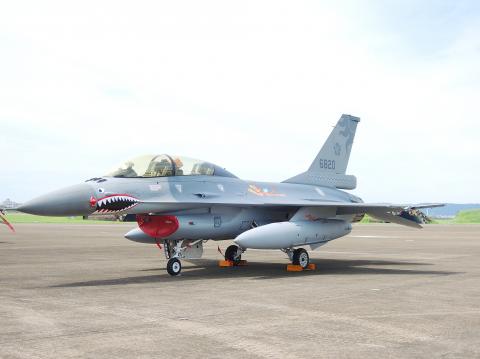Upgrades to the nation’s fleet of F-16 jets will cost the nation about NT$129.6 billion (US$4.31 billion), more than NT$19.6 billion higher than the original estimate, a military source said yesterday.
The sudden increase in the cost of the upgrades includes US military demands that Taiwan shoulder more of the research costs associated with improving the jets’ capabilities and the cost of the anti-radiation missiles (ARM) that the US has agreed to fit to the aircraft, the source said.
Price rises during weapons procurement from the US are not uncommon, the source said, citing US requests for NT$10.1 billion over the original NT$30.8 billion cost of the purchase of a long-range radar warning system in 2012.

Photo: Lo Tien-pin, Taipei Times
The two sides entered several rounds of negotiation before a final agreement was met on that deal, the source added.
The upgrades will give the nation’s aging fleet of F-16A and F-16B aircraft the new F-16V designation.
The F-16V will feature an AN/APG-83 active electronically scanned array radar, an upgraded mission computer system and cockpit improvements.
The nation has 144 F-16s all of which are to be upgraded, the source said, adding that the original NT$110 billion was expected to be paid by 2023. The cost increase means that military budgets for the next six years will need to be adjusted, the source said.
The original agreement to upgrade the jets was made in September 2011, and more recent negotiations saw the procurement of ARM missiles and Joint Standoff Weapon (JSOW) systems, the source said, adding that while high-level military personnel hope to acquire US weapons and upgrade defenses, increased costs mean future purchases might need to be done in a piecemeal fashion.
The source said that while the government might have known that purchasing the ARM and JSOW systems would increase costs, officials suggested that the purchase of the weapons could be put on hold.
Amendments to the defense budget are to be discussed at the legislative session that begins on Friday, the source said, adding that a more complete explanation for the discrepancy from the original cost of upgrading the jets would also be discussed.

Tropical Storm Gaemi strengthened into a typhoon at 2pm yesterday, and could make landfall in Yilan County tomorrow, the Central Weather Administration (CWA) said yesterday. The agency was scheduled to issue a sea warning at 11:30pm yesterday, and could issue a land warning later today. Gaemi was moving north-northwest at 4kph, carrying maximum sustained winds near its center of up to 118.8kph and gusts of 154.8kph. The circumference is forecast to reach eastern Taiwan tomorrow morning, with the center making landfall in Yilan County later that night before departing from the north coast, CWA weather forecaster Kuan Shin-ping (官欣平) said yesterday. Uncertainty remains and

SEA WARNING LIKELY: The storm, named Gaemi, could become a moderate typhoon on Wednesday or Thursday, with the Taipei City Government preparing for flooding A tropical depression east of the Philippines developed into a tropical storm named Gaemi at 2pm yesterday, and was moving toward eastern Taiwan, the Central Weather Administration (CWA) said. Gaemi could begin to affect Taiwan proper on Tuesday, lasting until Friday, and could develop into a moderate typhoon on Wednesday or Thursday, it said. A sea warning for Gaemi could be issued as early as Tuesday morning, it added. Gaemi, the third tropical storm in the Pacific Ocean this typhoon season, is projected to begin moving northwest today, and be closest to Taiwan on Wednesday or Thursday, the agency said. Today, there would likely

DISRUPTIONS: The high-speed rail is to operate as normal, while several airlines either canceled flights or announced early departures or late arrivals Schools and offices in 15 cities and counties are to be closed today due to Typhoon Gaemi, local governments announced last night. The 15 are: Taipei, New Taipei City, Taoyuan, Tainan, Keelung, Hsinchu and Kaohsiung, as well as Yilan, Hualien, Hsinchu, Miaoli, Chiayi, Pingtung, Penghu and Lienchiang counties. People should brace for torrential rainfall brought by the storm, with its center forecast to make landfall on the east coast between tonight and tomorrow morning, the Central Weather Administration (CWA) said. The agency issued a sea warning for the typhoon at 11:30pm on Monday, followed by a land warning at 11:30am yesterday. As of

CASUALTY: A 70-year-old woman was killed by a falling tree in Kaohsiung as the premier warned all government agencies to remain on high alert for the next 24 hours Schools and offices nationwide are to be closed for a second day today as Typhoon Gaemi crosses over the nation, bringing torrential rain and whipping winds. Gaemi was forecast to make landfall late last night. From Tuesday night, its outer band brought substantial rainfall and strong winds to the nation. As of 6:15pm last night, the typhoon’s center was 20km southeast of Hualien County, Central Weather Administration (CWA) data showed. It was moving at 19kph and had a radius of 250km. As of 3pm yesterday, one woman had died, while 58 people were injured, the Central Emergency Operation Center said. The 70-year-old